- Home
- Richard Dawkins
An Appetite for Wonder Page 25
An Appetite for Wonder Read online
Page 25
Again, same for me, despite the ludicrously ill-founded reputation for mathematical ability that I briefly enjoyed – or endured – in Bevington Road days. John Maynard Smith, as a mathematical biologist himself, engagingly expressed wonderment at how it is possible to ‘think in prose’. He said it in the London Review of Books in 1982, at the end of a joint review of The Selfish Gene and its sequel (aimed at professional biologists), The Extended Phenotype:
I have left till last what is to me the strangest feature of both books, because I suspect it will not seem strange to many others. It is that neither book contains a single line of mathematics, and yet I have no difficulty in following them, and as far as I can detect they contain no logical errors. Further, Dawkins has not first worked out his ideas mathematically and then converted them into prose: he apparently thinks in prose, although it may be significant that, while writing The Selfish Gene, he was recovering from a severe addiction to computer programming, an activity which obliges one to think clearly and to say exactly what one means. It is unfortunate that most people who write about the relation between genetics and evolution without the intellectual prop of mathematics are either incomprehensible or wrong, and not infrequently both. Dawkins is a happy exception to this rule.
Back to Darwin’s autobiographical soliloquy:
So poor in one sense is my memory, that I have never been able to remember for more than a few days a single date or a line of poetry.
That might well have been really true of Darwin, and it doesn’t seem to have held him back. My ability to remember poetry word for word hasn’t helped my science much, although it has enriched my life and I would not ever wish to lose it. Perhaps, too, a feeling for poetic cadence has some influence on writing style.
My habits are methodical, and this has been of not a little use for my particular line of work. Lastly, I have had ample leisure from not having to earn my own bread. Even ill-health, though it has annihilated several years of my life, has saved me from the distractions of society or amusement.
My habits are anything but methodical, and that – not ill health in my case – has surely annihilated what might have added up to years of more productive life. The same accusation could be levelled at the distractions of society or amusement (and playing with computers in my case), but life is for living as well as producing. I have had to earn my own bread. But – while happy to ignore the attacks I have (yes, really) received for being white, male and adequately educated – I cannot deny a measure of unearned privilege when I compare my childhood, boyhood and youth to others less fortunate. I do not apologize for that privilege any more than a man should apologize for his genes or his face, but I am very conscious of it. And I am grateful to my parents for giving me what will strike some as a favoured childhood. Others might consider it less than a blessing to have been sent away to the spartan regime of boarding school aged seven, but even there I have reason to be grateful to my parents, for whom this style of education was a great expense, necessitating sacrifices from them.
Darwin had earlier let his modesty guard drop a little when he considered his – by any standards formidable – powers of reasoning:
Some of my critics have said, ‘Oh, he is a good observer, but has no power of reasoning.’ I do not think this can be true, for the Origin of Species is one long argument from the beginning to the end, and it has convinced not a few able men. No one could have written it without having some power of reasoning.
Mr Darwin (never Sir Charles, and what an amazing indictment of our honours system that is), that last sentence should win a prize for world-class understatement. Mr Darwin, you are one of the great reasoners and one of the great persuaders of all time.
I am not a good observer. I’m not proud of it and I try eagerly, but I am not the naturalist my father and his father would have wished. I lack patience and have no great knowledge of any particular animal or – despite one privilege of my upbringing – plant group. I know the songs of only half a dozen common British songbirds, and can recognize only about the same number of constellations in our night sky or families of our wildflowers. I am much better at the phyla, classes and orders of the animal kingdom – and so I should be, having studied zoology at Oxford: for no other university placed such an emphasis on that classical approach to the subject.
The evidence suggests that I am a reasonably effective persuader. Needless to say, the subjects about which I persuade are small beer compared to Darwin’s – except in the sense that, amazingly, the job of persuading people of Darwin’s own truth is still not over, and I am one of the labourers in Darwin’s vineyard today. But that story belongs in the second half of my life, during which the majority of my books were written: it belongs in the companion volume that should follow in two years’ time – if I am not carried off by the unpredictable equivalent of a sneeze.
ACKNOWLEDGEMENTS
For advice, help and support of various kinds, I would like to thank Lalla Ward Dawkins, Jean Dawkins, Sarah and Michael Kettlewell, Marian Stamp Dawkins, John Smythies, Sally Gaminara, Hilary Redmon, Sheila Lee, Gillian Somerscales, Nicholas Jones, John Brockman, David Glynn, Ross and Christine Hildebrand, Bill Newton Dunn, R. Elisabeth Cornwell, Richard Rumary, Alan Heesom, Ian McAlpine, Michael Ottway, Howard Stringer, Anna Sander, Paula Kirby, Stephen Freer, Bart Voorzanger, Jennifer Jacquet, Lucy Wainwright, Bjorn Melander, Christer Sturmark, Greg Stikeleather, Ann-Kathrin Ehlers, Jan and Richard Gendall, Rand Russell.
TEXT ACKNOWLEDGEMENTS
Every effort has been made to trace the copyright holders, but any who have been overlooked are invited to get in touch with the publishers.
‘To the Balliol Men Still in Africa’ by Hilaire Belloc reprinted by permission of Peters Fraser & Dunlop (www.petersfraserdunlop.com) on behalf of the Estate of Hilaire Belloc.
Extract from Iris Murdoch: A Life by Peter J. Conradi © Peter J. Conradi, 2001, reprinted by permission of A. M. Heath & Co Ltd and W. W. Norton.
Extract from The Autobiography of Bertrand Russell by Bertrand Russell © 2009 The Bertrand Russell Peace Foundation, reprinted by permission of Taylor & Francis Books UK and The Bertrand Russell Peace Foundation Ltd.
Lyrics from ‘A Song of Reproduction’ reprinted by permission of the Estates of Michael Flanders & Donald Swann 2013. Any use of Flanders & Swann material, large or small, should be referred to the Estates at [email protected].
Extract from ‘Summoned by Bells’ from Collected Poems by John Betjeman © 1955, 1958, 1962, 1964, 1968, 1970, 1979, 1981, 1982, 2001 reprinted by permission of John Murray (Publishers) and The Estate of John Betjeman.
Extract from ‘A Hike on the Downs’ from Collected Poems by John Betjeman © 1955, 1958, 1962, 1964, 1968, 1970, 1979, 1981, 1982, 2001 reprinted by permission of John Murray (Publishers) and The Estate of John Betjeman.
Extract from The Loom of Years by Alfred Noyes © 1902 reprinted by permission of The Society of Authors as the Literary Representative of the Estate of Alfred Noyes.
‘Blue Suede Shoes’ by Carl Lee Perkins © 1955, 1956 Hi Lo Music, Inc. © Renewed 1983, 1984 Carl Perkins Music, Inc. Administered by Wren Music Co., Division of MPL Music Publishing, Inc. All rights reserved. International copyright secured. Used by permission of Music Sales Limited.
Extract from The Silent Traveller in Oxford by Chiang Yee © 1944 Signal Books Ltd.
Extract from W. D. Hamilton, ‘The Play by Nature’, Science 196: 757 (1977), reprinted with permission from AAAS.
Extract from Leda by Aldous Huxley. Copyright © 1929 by Aldous Huxley. Reprinted by permission of Georges Borchardt, Inc., on behalf of the Aldous and Laura Huxley Trust. All rights reserved.
Extract from ‘Genes and Memes’ by John Maynard Smith, first published in London Review of Books, 4 February 1982.
Extract from ‘Selective Neurone Death as a Possible Memory Mechanism’ by Richard Dawkins, first published in Nature (Nature Publishing Group), 8 January 1971.
Extract from Richard D
awkins’ Foreword to John Maynard Smith, The Theory of Evolution (Cambridge University Press, 1993).
Extracts from Preface, chapter 1 and chapter 13 of The Selfish Gene by Richard Dawkins (1976). Reprinted by permission of Oxford University Press.
PICTURE ACKNOWLEDGEMENTS
All photos come from the Dawkins family collection (thanks to Sarah Kettlewell) except where otherwise acknowledged. Every effort has been made to trace copyright holders, but any who have been overlooked are invited to get in touch with the publishers.
Images in the text
From “Learning the Trade”: Cerura vinula: photo courtesy N. Tinbergen.
Illustration sections
Section one
St Mary’s Church, Chipping Norton: photo courtesy Nicholas Kettlewell.
Clinton Edward Dawkins (1880), Clinton George Evelyn Dawkins (1902), Clinton John Dawkins (1934), Arthur Francis ‘Bill’ Dawkins (1935/6): photos courtesy Balliol College, Oxford.
Section two
Emperor Swallowtail (Papilio ophidicephalus): © Ingo Arendt/Minden Pictures/Corbis.
Section three
The Great Hall, Oundle School, Northamptonshire: © Graham Oliver/ Alamy; Ioan Thomas, 1968: Oundle School Archive.
Niko Tinbergen painting hens’ eggs to resemble gulls’ eggs, c.1964: Time & Life Pictures/Getty Images; Mike Cullen, 1979: Monash University Archives, photo Hervé Alleaume; the Surrey Puma hunt: photo courtesy Virginia Hopkinson; People’s Park demonstrators and the National Guard, Berkeley, 19 May 1969: © Bettmann/Corbis; punting in Oxford: photo courtesy Lary Shaffer; Peter Medawar at University College, 26 November 1960: Getty Images.
RD and Ted Burk, November 1976: Time & Life Pictures/Getty Images; Danny Lehrman and Niko Tinbergen: photo courtesy Professor Colin Beer; Niko Tinbergen filming: courtesy Lary Shaffer.
William D. Hamilton and Robert Trivers, Harvard, 1978: photo courtesy Sarah B. Hrdy; Michael Rodgers: photo courtesy Nigel Parry; RD and George C. Williams: photo by Rae Silver courtesy John Brockman; John Maynard Smith: Corbin O’Grady Studio/Science Photo Library; The Selfish Gene: courtesy Keith Cullen.
INDEX
The pagination of this electronic edition does not match the edition from which it was created. To locate a specific entry, please use your e-book reader’s search tools.
Abbott, Roger 220, 234
Adam, Jan 184, 185, 186-7
Adams, Douglas 221
Adams, Richard 111
Africa 85
Dawkins family in 25, 29-40, 43-53, 55-60, 69
in Second World War 29-34
albatrosses 260
Albery, John 163
Ali (servant and companion) 30, 31, 50
altruism 130-1, 259-60, 264
reciprocal 271
social 198-9
ancestry 5
Anderson, Lindsay 137
Andrew, Richard 273
Animal Behaviour (journal) 187
animals
classification 161
design 159-60
empathy with 97-8
prey 180-1, 252
see also ethology
Annestown, Ireland 199
ants 198-9
apoptosis 223
Ardrey, Robert
Shadow of Heroes 163
The Social Contract 261
The Territorial Imperative 261
Army Cadet Corps 125-6, 127
art 46
artificial intelligence 234
Attenborough, David 116
Attention Threshold Model 190-1, 210
Australia 172
Ayer, Sir A. 218
babies (human)
family resembance 10
visual perception 183
Baden-Powell, Robert, 86
funeral 31
Baerends, G. P. 251
Baez, Joan 46
Balliol College, Oxford 7-8, 92, 290
RD at 145, 149-53, 162-5
amateur dramatics at 162-3
Gordouli song 49
‘To the Balliol Men Still in Africa’ (Belloc) 8-9
Victorian Society 163-4
Barlow, George 196, 201, 207, 208, 209, 219
Bateson, Patrick 243, 255
Beeching, H. C. 7
Beer, Colin 211, 215-16
bees 130-1, 133-4
Belloc, Hilaire: ‘To the Balliol Men still in Africa’ 8-9
Bennet-Clark, Henry 238
Bentley, David 208, 236
Bergman, Ingmar 165
Berkeley, California 205-10, 215
see also University of California at Berkeley
Betjeman, John 24, 119, 139
Bible 64, 103, 132, 218
biochemistry 153, 167-8, 287-8
biology 13, 15, 158, 233, 290
sociobiology 208
birds 14, 260
courtship behaviour 253-4, 267
drinking 225-8, 229
Bertram Smythies’ books on 12
see also chicks
birdsong 178-9, 243
Blackmore, Susan 280
blacksmith 129
Book of Mormon 64
Borneo 12
Bowra, Maurice 152
Breton languages 15
British Empire 79, 163
see also Colonial Service
Brooke, Rupert 165, 166
brothers 115-16
Brown, Dick 174
Brunet, Peter 153, 157, 158, 167
Bulhak, Andrew 235
bullying 124-5, 206-7
internet 98
school 66-7, 96-8
Burk, Ted 236
Burma 9, 12, 23
butterflies 57
Cadet Corps 125-6, 127
Caernarvon Castle (ship) 55
Cain, Arthur 158, 161-2
Cambridge University 25, 150-1, 154
Department of Zoology, subDepartment of Animal Behaviour (Madingley) 176, 243
1975 conference 243; RD’s paper at 243-4, 246, 251, 255
Natural Science Tripos 157
Camm, F. J. 20-1
Campbell, Bruce 282
Campbell, Major 105-6, 110, 116
camping 114
Cape Town 29
Carroll, Lewis 10, 217, 260
cars 59, 89, 109, 114, 144
Cartwright, W. ‘Boggy’ 126
Cary, Frank (‘Tank’) 63, 65, 67
Cassiopeia (boat) 29
caterpillars 180-1
catfish 180
Ceylon 21
Chafyn Grove school, Salisbury 81, 85-106, 109
chapel 100-1, 103-4
corporal punishment 87
Railway Club 104-5
religion 100-1, 102-3
reports 95
school play 92-3
Scout Troop 91
visiting lecturers 101-2
Chaliapin, Feodor 50
cheetahs 252
St Anne’s School, Chelmsford 76
Chetwood Aiken, K. O. 104-5
Chiang Yee: The Silent Traveller in Oxford 152
chicks
drinking 225-8, 229
pecking 179, 182-3, 185-9, 189-90, 209-10; Attention Threshold Model 189-90, 210; colour choice 185-8, 190, 209; Drive Threshold Model 187-90, 209, 210; sequence 186, 209-10; timing 189
children
babies 10, 183
credulity 51, 102
cruelty 66-7, 96-8, 122
fantasy 45-6, 80
language 14, 39, 46-7, 85
peer pressure 128
and prayer 67-8, 77, 80
separation from parents 23
songs 57
weaning 270-1
Chipping Norton 141
choice, testing see Drive Threshold Model
choir 136-7
Chopin, Frédéric: Nocturnes 56
Christianity 13, 139-40, 144
Confirmation 102-3
Christmas 52, 75
Father Christmas 38, 50-2
circumcision 36-7
Clint
on, General Sir Henry 4, 5
code, for letters 39
Collins, Judy 46
Colonial Service 9-10, 11, 23, 25, 79
Colyear, Lady Juliana 9
comfort blankets 74-5
computer programming 192-3, 194, 221-2, 234-6, 253, 291
‘Dawkins Organ’ 219-21, 230, 231
and grammar 234-5, 238, 244-6
hierarchical organization 249-51
languages 192, 219, 234; Algol-60 234, 236, 253; BASIC 236; BEVPAL 221; Elliott Autocode 194; Fortran 233, 234; K-Autocode 192; SysGen 233-4; translation 236
music 219-21, 231-2, 236-8
Mutual Replaceability Cluster Analysis 249-51
for PDP-8 233
‘Postmodernism Generator’ 235
STRIDUL-8 236-8, 239
computers 191-2, 193-4, 218-22, 239
early American 192
Elliott 803 194, 218-19, 232
KDF9 192
Moore’s Law 218-19, 239
PDP-8 219, 233, 234
writing on 276-7
confirmation 102-3
Conradi, Peter 12-13
control theory 233
Copplestone, Miss (school matron) 65-6
Corley, Hugh 133-4
Cornish 15-17, 18
Cornwall 18, 19, 21, 55
corporal punishment 87, 137
courtship behaviour
crickets 236-8
guppies 249, 250, 251
pheasants 267
pigeons 253-4
Creed, Robert 160
crested cranes 58
cricket (sport) 153-4
crickets (insects): courtship song 236-8
Croze, Harvey 175
Cuckoos farmhouse, Essex 75, 77
Cullen, Mike 171-4, 175, 197, 201, 216, 221, 232, 243
Currey, John 159
Daly, Mrs 79
Darlington, Cyril 282
Darwin, Charles 141, 278, 290-1, 292, 293-4
Origin of Species 293
Darwinism

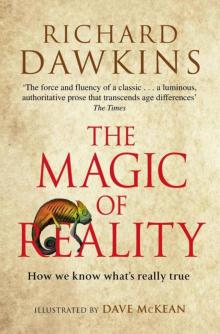 The Magic of Reality
The Magic of Reality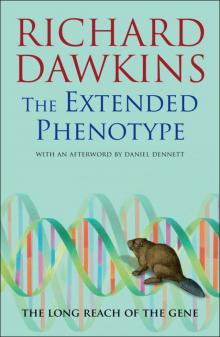 The Extended Phenotype
The Extended Phenotype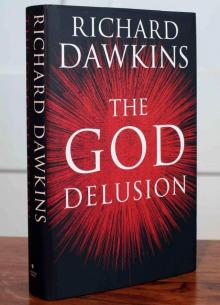 The God Delusion
The God Delusion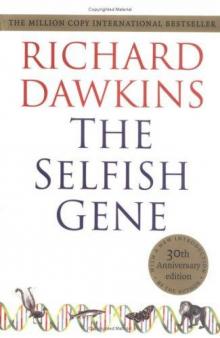 The Selfish Gene
The Selfish Gene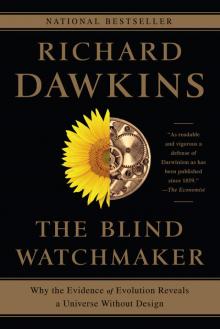 The Blind Watchmaker
The Blind Watchmaker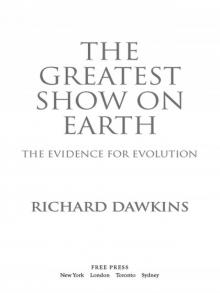 The Greatest Show on Earth
The Greatest Show on Earth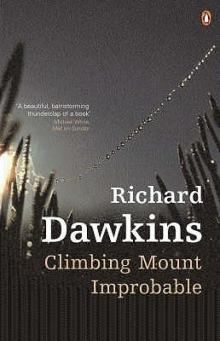 Climbing Mount Improbable
Climbing Mount Improbable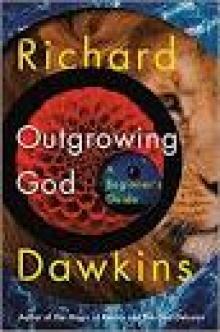 Outgrowing God
Outgrowing God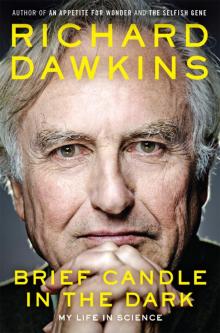 Brief Candle in the Dark
Brief Candle in the Dark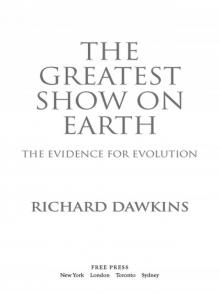 The Greatest Show on Earth: The Evidence for Evolution
The Greatest Show on Earth: The Evidence for Evolution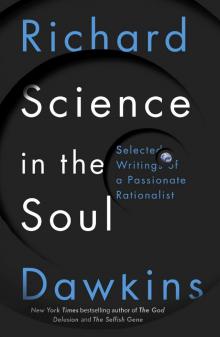 Science in the Soul
Science in the Soul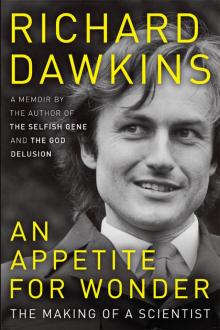 An Appetite for Wonder
An Appetite for Wonder